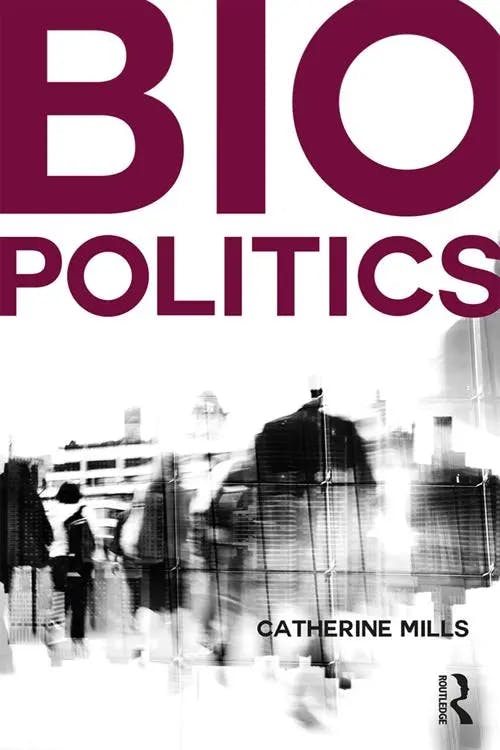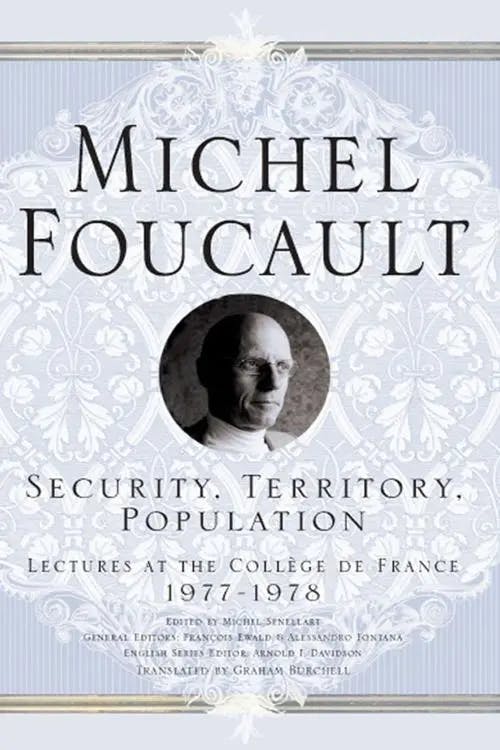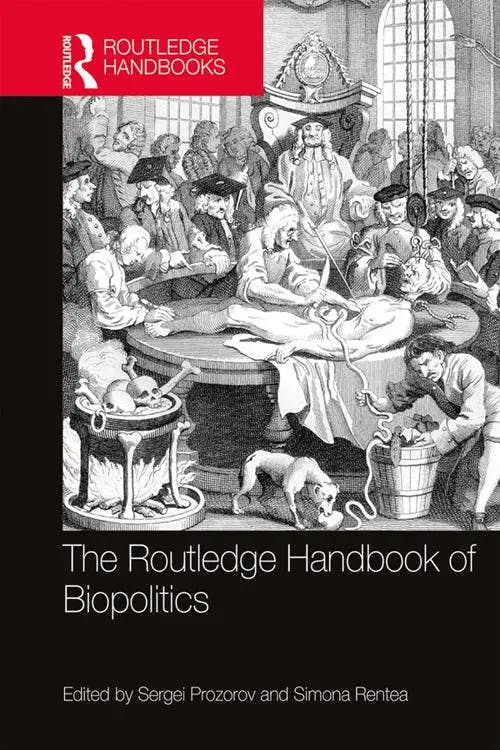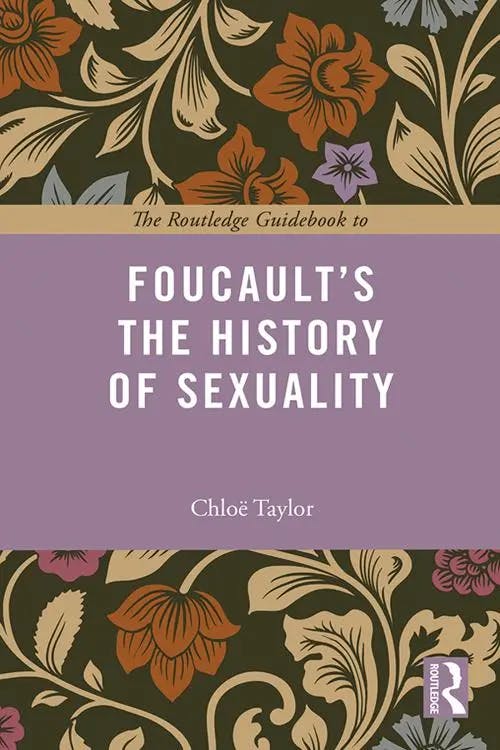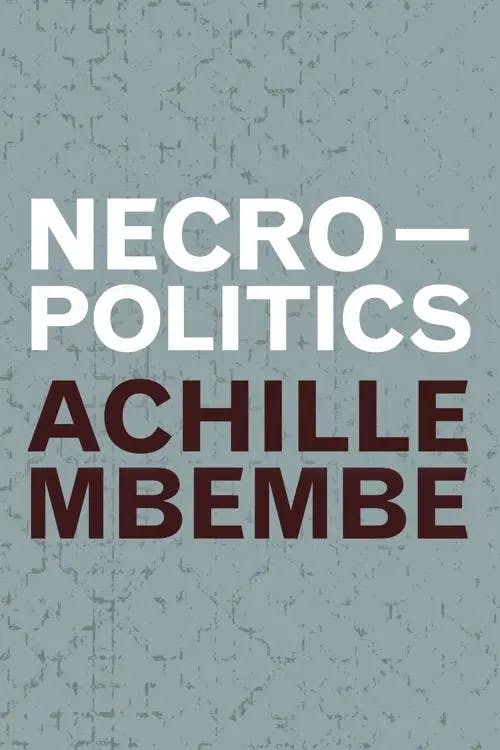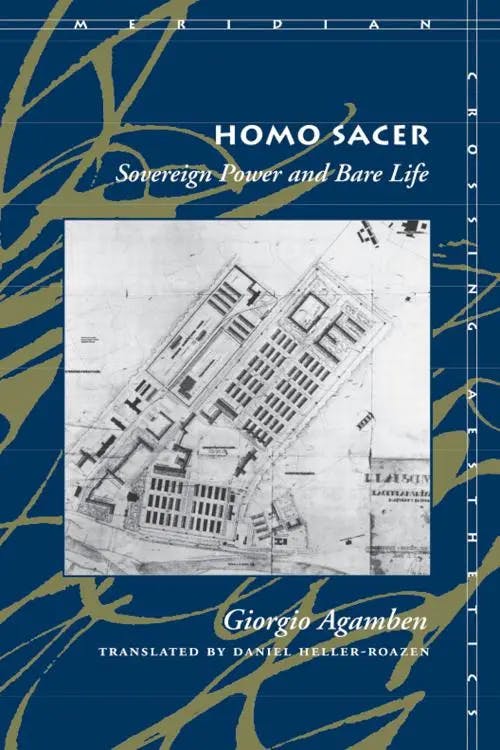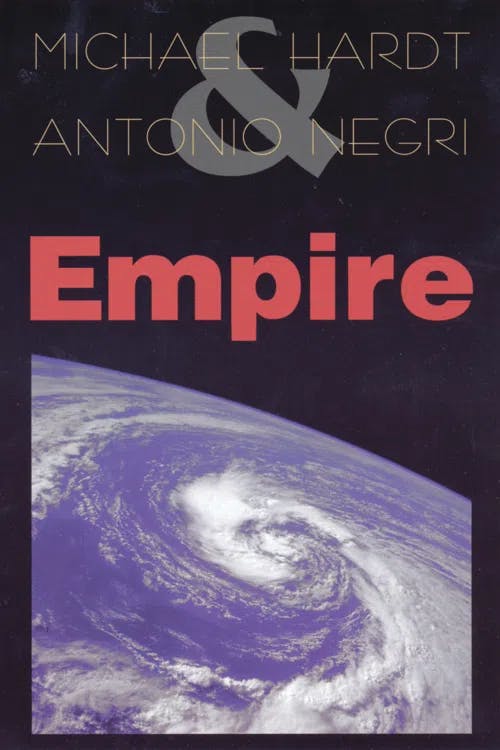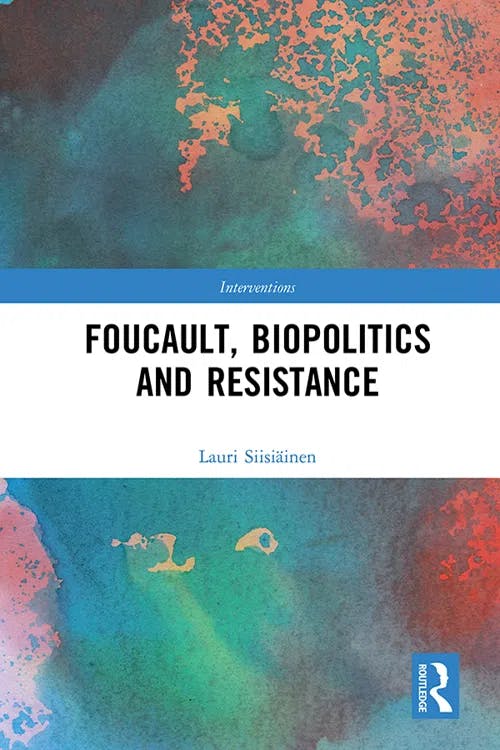What is Biopower & Biopolitics?
MSt, Women's, Gender & Sexuality Studies (University of Oxford)
Date Published: 30.05.2023,
Last Updated: 19.07.2024
Share this article
Definitions and origins: Foucault's types of power
Biopower and biopolitics, terms associated with Michel Foucault, describe the political regulation of life processes. Foucault writes in The History of Sexuality, Volume 1 (1976, [1990]) that biopower employs “numerous and diverse techniques for achieving the subjugation of bodies and the control of populations” by entangling itself with biological processes and cultivating life deemed socially useful. Biopolitics can be defined as “politics that deals with life.” However, this feels overly simplistic or even redundant. Doesn’t all politics deal with life? In Biopolitics: An Advanced Introduction (2011), Thomas Lemke investigates how the relationship between life and politics has been historically understood in two ways — life as the basis of politics and life as the object of politics — and presents Foucault’s ideas as an explicit break with these traditions (Lemke, 2011). Foucault first mentions biopolitics in a 1974 essay, and he most systematically outlines the theory in his lectures at the Collège de France from 1975 to 1978 and in The History of Sexuality. In these works, Foucault articulates a new understanding of the relationship between life and politics that continues to inform critical theory today.
Some scholars use the terms “biopower” and “biopolitics” interchangeably, while others draw a distinction between them. While Lemke argues that Foucault does not differentiate these terms, Catherine Mill disagrees. In Biopolitics (2017), Mills writes,
The more general of these was ‘biopower’, which he argued encompassed both a disciplinary power focused on the individual body, and ‘biopolitics’, which focused on the new political subject of the population. [...] However, in contemporary debates the term ‘biopower’ has largely been abandoned, and ‘biopolitics’ is taken as a more general term that means both the state and non-state (or quasi-state) management of life.
Catherine Mills
The more general of these was ‘biopower’, which he argued encompassed both a disciplinary power focused on the individual body, and ‘biopolitics’, which focused on the new political subject of the population. [...] However, in contemporary debates the term ‘biopower’ has largely been abandoned, and ‘biopolitics’ is taken as a more general term that means both the state and non-state (or quasi-state) management of life.
Michael Hardt and Antonio Negri draw a different distinction between biopower and biopolitics in their expansion upon Foucault’s theories. For these thinkers, biopower is imposed from above whereas biopolitics emerges from within society itself, shaping labor and social relationships. We explore Hardt and Negri’s theories below (see “Development of biopower/biopolitics since Foucault”).
Foucault theorizes three kinds of power: sovereign power, disciplinary power, and biopower (see our power/knowledge study guide for more on Foucault’s theories). In his 1977–78 course, Security, Territory, Population (2007), Foucault explores the differences between these kinds of power in relation to how they punish violations of legal prohibitions like “you must not kill, you must not steal.”
Under sovereign power, a violator of these prohibitions would be punished — executed, flogged, exiled, fined. After disciplinary power emerged in the eighteenth century, however, power became not only invested in the violator’s momentary punishment but also in what provoked their crime and whether they would recidivate. Foucault explains,
now everything is framed by, on the one hand, a series of supervisions, checks, inspections, and varied controls that, even before the thief has stolen, make it possible to identify whether or not he is going to steal, and so on. And then, on the other hand, at the other end, punishment will not just be the spectacular, definitive moment of the hanging, fine, or banishment, but a practice like incarceration with a series of exercises and a work of transformation on the guilty person in the form of what we call penitentiary techniques: obligatory work, moralization, correction, and so forth. (2007)
Michel Foucault
now everything is framed by, on the one hand, a series of supervisions, checks, inspections, and varied controls that, even before the thief has stolen, make it possible to identify whether or not he is going to steal, and so on. And then, on the other hand, at the other end, punishment will not just be the spectacular, definitive moment of the hanging, fine, or banishment, but a practice like incarceration with a series of exercises and a work of transformation on the guilty person in the form of what we call penitentiary techniques: obligatory work, moralization, correction, and so forth. (2007)
In other words, disciplinary power does not stop at responding to crime in the moment: it employs surveillance to predict behavior and disciplinary processes to correct, not the crime, but the individual who committed it.
Finally, with fully developed biopolitics, power targets crime in the population, making generalizations about types of criminals, tracking crime rates across demographic groups, and investigating the cost of crime to society and to the state. Biopower ultimately prioritizes “how to keep a type of criminality, theft for instance, within socially and economically acceptable limits and around an average that will be considered as optimal for a given social functioning” (Foucault, 2007). While disciplinary power and biopower often employ the same tactics, the focus shifts from discipline of the individual to biopolitical control of the population.
Foucault sometimes describes disciplinary power and biopower as distinct (though overlapping) types of power; other times, disciplinary power appears to be one of “two basic forms” of biopower (Foucault, 1990). Disciplinary power treats the body as a complex machine, seeking to discipline, optimize, and integrate the body into “systems of efficient and economic controls” through an “anatomo-politics of the human body” (Foucault, 1990). Disciplinary power tends to function through institutions, employing tactics like incarceration and surveillance to target individuals. Biopower, on the other hand, focuses on the “species body” and biological processes — “propagation, births and mortality, the level of health, life expectancy and longevity” — through “a biopolitics of the population,” often functioning through the state (Foucault, 1990).
Individuals and populations are necessarily linked, and the state is often directly involved in institutions (i.e., the army, the school.). The precise relationship between disciplinary power and biopower is thus difficult to disentangle. Biopolitics aims to increase and optimize life deemed useful, affecting both individual bodies and the larger body politic.
How biopower functions
The right to life and death
According to Foucault, before the emergence of biopolitics, society was governed by sovereign power. The sovereign ruled through the “right of seizure: of things, time, bodies, and ultimately life itself” (Foucault, 1990). Foucault writes that the “sovereign exercised his right of life only by exercising his right to kill, or by refraining from killing” (1990).
While sovereign power could “take life or let live,” biopower could “foster life or disallow it to the point of death” (Foucault, 1990). As Simona Rentea writes, biopolitics “takes death as its limit” and, through the vital power of biopolitics, “the order of sovereignty is radically transformed”:
Death is the point where life escapes its capture while at the same time it becomes power’s most secret and shameful aspect as the positive economy of biopolitics focused on fostering life and its productive capacities is, at the same time, unafraid of deploying its more ‘lethal’ weapons. (2016)
Edited by Sergei Prozorov & Simona Rentea
Death is the point where life escapes its capture while at the same time it becomes power’s most secret and shameful aspect as the positive economy of biopolitics focused on fostering life and its productive capacities is, at the same time, unafraid of deploying its more ‘lethal’ weapons. (2016)
While sovereign power could only seize life, biopower could permeate all aspects of life. This constitutive power is harder to recognize than deductive power but no less lethal. As Rentea explains,
Death and massacres do not disappear but become vital. They are no longer fought in the name of the sovereign’s right to defend himself but are increasingly instrumentalised in the service of the survival of the species. (2016)
Biopower works to help desirable populations flourish, while other populations are construed as threats to the health of the societal body. Biopower can kill in the name of life. We can now see a connection between biopolitics and eugenics, but questions of who is encouraged to reproduce versus allowed to die touch on a variety of topics — responses to pandemics, policies regarding asylum seekers, regulations on abortion, directives of patients regarding life-prolonging measures, and more.
Society of blood versus society of sex
Foucault identifies sex as a primary site of biopower’s influence, as reproduction involves both individual anatomo-politics and population-driven biopolitics. Foucault argues that under sovereign power, identity and power were associated with blood: the threat of bloodshed, the meaning of risking one’s blood, the influence of one’s bloodline: “blood was a reality with a symbolic function” (Foucault, 1990). Under biopower, we shift from a “society of blood” to a “society of ‘sex,’ or rather a society ‘with a sexuality’” (Foucault, 1990). Foucault locates power as operating through sexuality; sexual discourses surround us and inform many of our modern political struggles, and our identities have become tied to our sexual practices and desires.
Laws versus norms
Foucault also identifies a “very profound transformation” of the “mechanisms of power” employed by sovereign power versus biopower. Rather than a power to seize, biopower is,
working to incite, reinforce, control, monitor, optimize, and organize the forces under it: a power bent on generating forces, making them grow, and ordering them, rather than one dedicated to impeding them, making them submit, or destroying them. (Foucault, 1990)
This important change results in a shift from a reliance on external laws to a reliance on internalized norms. As Chloe Taylor argues,
Biopolitics and disciplinary power are able to access the body because they function through norms rather than laws. (2016)
Chloe Taylor
Biopolitics and disciplinary power are able to access the body because they function through norms rather than laws. (2016)
Norms are maintained by the society itself, and they stretch beyond the law, affecting our everyday habits and sense of self. We can see these norms at work in everything, from habitually brushing our teeth to “correcting” gendered behavior deemed “atypical” in children.
Three key meanings of biopolitics
Over the course of Foucault’s works, biopolitics develops three key meanings:
- Biopolitics describes a modern practice of power, resulting from the historical transformation of sovereign power into biopower.
- Biopolitics also indicates a shift from the “political-military discourse” of sovereign power to a “racist-biological” one (Lemke, 2011). According to Foucault, biopower’s division of people into those who must live and those who must die is racism in a fundamental sense.
- Biopolitics is a particular product of liberalism, an idea which Foucault explores in depth in his lectures, The Birth of Biopolitics (1978–79).
Necropolitics
The dual power of biopolitics — to foster life and to let die — has produced a differentiation in terms. Foucault sometimes uses “thanatopolitics” to describe the power over death (as opposed to biopolitics, the power over life).
Building on these ideas, Achille Mbembe coined the term “necropolitics” in his study of who power deems must die. Mbembe argues that bipower alone is insufficient to describe “contemporary forms of subjugating life to the power of death.” Mbembe writes,
I have put forward the notion of necropolitics, or necropower, to account for the various ways in which, in our contemporary world, weapons are deployed in the interest of maximally destroying persons and creating death-worlds, that is, new and unique forms of social existence in which vast populations are subjected to living conditions that confer upon them the status of the living dead. (2019)
Achille Mbembe
I have put forward the notion of necropolitics, or necropower, to account for the various ways in which, in our contemporary world, weapons are deployed in the interest of maximally destroying persons and creating death-worlds, that is, new and unique forms of social existence in which vast populations are subjected to living conditions that confer upon them the status of the living dead. (2019)
The concepts of death-worlds (spaces made unlivable) and the living dead (populations treated as socially dead) are core to necropolitical theory. Necropolitics can aid analysis of a range of topics. For example, Necropolitics (2015) focuses on practices of mass graves and exhumations across the world, while R. Guy Emerson examines violence and “living death” in Mexico in Necropolitics (2019). Queer Necropolitics(2014) examines extreme and everyday examples of how queer people around the world are forced to, or allowed to, die.
Development of biopower/biopolitics since Foucault
Since Foucault, scholars have aimed to clarify, respond to, and reformulate his theories of biopolitics. Here are some major contemporary thinkers who have produced influential scholarship on biopolitics.
Giorgio Agamben
Giorgio Agamben’s theory of biopolitics, most clearly articulated in Homo Sacer (1998), views biopolitics not as a replacement of sovereign power but instead as core to it. In other words, Agamben does not identify a complete change in how power functions but rather a radicalization of what was already there.
Agamben focuses on the difference between biological and political life. Tracing biopolitics back to antiquity, Agamben explores the figure of the “homo sacer,” the sacred man, who could be killed without punishment. Here, Agamben locates a distinction between bare life (zoē), common to all living beings, and political life (bios) — the difference between biological and legal existence. The homo sacer possesses bare life but no political life, and Agamben follows this figure banned from political existence throughout history, from Roman exiles to those held in Nazi concentration camps.
Agamben argues that this separation between bare life and political life is a core biopolitical paradigm for democracy and totalitarianism alike. Someone is always excluded from political life. Agamben declares the camp the “hidden paradigm of the political space of modernity,” as it marks the border between bare life and political existence that all forms of modern government police (1998).
While Agamben sees a consistency in this idea since the ancient world, he does notice a shift in our modern biopolitics. He writes,
the realm of bare life—which is originally situated at the margins of the political order—gradually begins to coincide with the political realm, and exclusion and inclusion, outside and inside, bios and zoē, right and fact, enter into a zone of irreducible indistinction. (Agamben, 1998)
Giorgio Agamben
the realm of bare life—which is originally situated at the margins of the political order—gradually begins to coincide with the political realm, and exclusion and inclusion, outside and inside, bios and zoē, right and fact, enter into a zone of irreducible indistinction. (Agamben, 1998)
Bare life has become the subject and object of political order. Agamden describes the double-sided nature of modern biopolitics:
the spaces, the liberties, and the rights won by individuals in their conflicts with central powers always simultaneously prepared a tacit but increasing inscription of individuals’ lives within the state order, thus offering a new and more dreadful foundation for the very sovereign power from which they wanted to liberate themselves. (1998)
According to Agamben, rights that seem in the realm of bare life have, in our modern world, become politically inscribed. Lemke rearticulates Agamben’s idea, writing that biopolitics “focuses on living beings rather than on legal subjects—or, to be more precise, it deals with legal subjects that are at the same time living beings” (2011). For Agamben, this treatment of legal subjects as living beings has tended toward a merging of these two terms. Life is increasingly legally described and determined.
Michael Hardt and Antonio Negri
Rather than viewing biopolitics as the paradigm of a history leading toward Nazi concentration camps, literary theorist Michael Hardt and philosopher Antonio Negri provide a different attempt at updating biopolitics. In Empire (2000) and Multitude (2004), Hardt and Negri build on Marxist traditions, Italian workers’ movements, and poststructural critiques of identity and subjectivity to propose a vision of biopolitics as a new stage of capitalism in which the borders of economics and politics, production and reproduction, disappear.
Hardt and Negri argue that, over the course of the twentieth century,
the role of industrial factory labor has been reduced and priority given instead to communicative, cooperative, and affective labor [“immaterial labor”]. In the postmodernization of the global economy, the creation of wealth tends ever more toward what we will call biopolitical production, the production of social life itself, in which the economic, the political, and the cultural increasingly overlap and invest one another. (2000)
Michael Hardt and Antonio Negri
the role of industrial factory labor has been reduced and priority given instead to communicative, cooperative, and affective labor [“immaterial labor”]. In the postmodernization of the global economy, the creation of wealth tends ever more toward what we will call biopolitical production, the production of social life itself, in which the economic, the political, and the cultural increasingly overlap and invest one another. (2000)
Modern biopolitical production is concerned with all forms of social and bare life — language, culture, subjectivity, relationships: “There is nothing, no ‘naked life,’ no external standpoint, that can be posed outside this field permeated by money; nothing escapes money “(Hardt and Negri, 2000).
Hardt and Negri make another significant contribution to biopolitical theory by accounting for the possibility of affirmative biopolitics, or biopolitical resistance. While there is a form of biopower (biopotere) that is imposed by the Empire, there is also biopolitical potential (biopotenza) held by the multitude, or the society itself.
Roberto Esposito
Roberto Esposito offered another new way of understanding biopolitics. In Immunitas (2002), and Bíos (2004), Esposito proposes the “immunitary paradigm,” a self-defensive logic embedded into social and political systems. Employing the medical understanding of immunization, Esposito argues that threats to our political or social communities are actually incorporated within them in tolerable ways, inoculating against this external enemy. The immunitary paradigm “reproduces in a controlled form exactly what it is meant to protect us from. [...] The body defeats a poison not by expelling it outside the organism, but by making it somehow part of the body” (Esposito, 2002, [2017]). Esposito continues,
For life to remain as such, it must submit itself to an alien force that, if not entirely hostile, at least inhibits its development. It must incorporate a fragment of the nothingness that it seeks to prevent, simply by deferring it. [...] it can prolong life, but only by continuously giving it a taste of death. (2002, [2017])
Roberto Esposito
For life to remain as such, it must submit itself to an alien force that, if not entirely hostile, at least inhibits its development. It must incorporate a fragment of the nothingness that it seeks to prevent, simply by deferring it. [...] it can prolong life, but only by continuously giving it a taste of death. (2002, [2017])
Hardt, Negri, and Esposito all acknowledge the potential of affirmative biopolitics and biopolitical resistance. Lauri Siisiäinen dedicates her book Foucault, Biopolitics and Resistance (2018) to these possibilities. Siisiäinen describes resistant biopolitics as
an idea of politics of life, of living multitude of forces, in which life is no longer the object of political practices that control and appropriate it, but generates their peculiar subject. Such affirmative politics of life diverges from, opposes and clashes with the biopower that captures and uses the forces and capacities of life at the level of both individual subjects and populations, especially by turning them into productive resources available for capitalist exploitation. (2018)
Lauri Siisiäinen
an idea of politics of life, of living multitude of forces, in which life is no longer the object of political practices that control and appropriate it, but generates their peculiar subject. Such affirmative politics of life diverges from, opposes and clashes with the biopower that captures and uses the forces and capacities of life at the level of both individual subjects and populations, especially by turning them into productive resources available for capitalist exploitation. (2018)
Siisiäinen describes techniques of “immunization” (building on Esposito’s paradigm) and of aesthetics and sensuality that reimagine aspects of biopolitics in defiance of biopower’s efforts of subjugation. As scholars continue to reimagine Foucault’s theories, and the need to envision methods of resistance becomes increasingly urgent, affirmative biopolitics may prove a fascinating and fruitful area of inquiry.
Where to next?
While the entanglement of politics and life seems like a simple paradigm, the meaning of biopolitics continues to shift across scholarly texts. The questions that biopolitics and biopower raise have proven useful to scholars researching a variety of topics.
Scholars approach various contemporary issues through the lens of biopolitics — water scarcity, the war on terror, child migration — while historians and political theorists examine the past through present theories; for example, see Sergei Prozorov’s The Biopolitics of Stalinism (2016), Matthew Newsom Kerr’s Contagion, Isolation, and Biopolitics in Victorian London (2017), and Kimberly Mair’s The Biopolitics of Care in Second World War Britain (2022).
Biopolitical readings of literature and film have increased in recent years, addressing topics from The Biopolitics of Gender in Science Fiction (Cox-Palmer-White, 2021) to muscled men in cinema (Rushing, Descended from Hercules, 2016). Arne De Boever’s Narrative Care (2013) offers a close reading of several contemporary narratives of care through the lens of biopolitics.
Researchers focusing on the posthuman and nonhuman animals expand biopower and biopolitics past Foucault’s original theories to address power dynamics affecting more than human life. In Biopolitics of the More-Than-Human (2020), Joseph Pugliese uses biopolitics to examine the ecological effects of human warfare, highlighting the nonhuman victims of colonialism entangled with and subject to the same violent biopolitical regimes as humans. In Animacies (2012), Mel Y. Chen combines applications of biopolitics to queerness, race, and nonhuman creatures to formulate a theory of animacy, exploring “how matter that is considered insensate, immobile, deathly, or otherwise ‘wrong’ animates cultural life in important ways.”
While the meanings and applications of biopower and biopolitics continue to shift, the core interest in how power becomes entangled with our lives at basic biological moments, like birth and death, is an important one. Biopolitics asks us to consider: whose lives are encouraged and whose are deemed expendable?
Further reading on Perlego
Beyond Biopolitics: Essays on the Governance of Life and Death (2011) edited by Patricia Ticineto Clough and Craig Willse
Foucault: A Critical Introduction (2013) by Lois McNay
Resisting Biopolitics: Philosophical, Political, and Performative Strategies (2015) edited by
The Omnibus Homo Sacer (2017) by Giorgio Agamben
Roberto Esposito: Biopolitics and Philosophy (2018) edited by Inna Viriasova, Antonio Calcagno
Arendt, Natality and Biopolitics: Toward Democratic Plurality and Reproductive Justice (2018) by Rosalyn Diprose and Ewa Plonowska Ziarek
Biopower/Biopolitics FAQs
What are biopolitics and biopower in simple terms?
What are biopolitics and biopower in simple terms?
What are examples of biopower/biopolitics?
What are examples of biopower/biopolitics?
Who are the major thinkers associated with biopolitics?
Who are the major thinkers associated with biopolitics?
What are key texts on biopower/biopolitics?
What are key texts on biopower/biopolitics?
Bibliography
Agamben, G. (1998) Homo Sacer: Sovereign Power and Bare Life. Translated by D. Heller-Roazen. Stanford University Press. Available at: https://www.perlego.com/book/745251/homo-sacer-sovereign-power-and-bare-life-pdf
Boever, A. D. (2013) Narrative Care: Biopolitics and the Novel. Bloomsbury Publishing. Available at: https://www.perlego.com/book/818124/narrative-care-biopolitics-and-the-novel-pdf
Chen, M. (2012) Animacies: Biopolitics, Racial Mattering, and Queer Affect. Duke University Press. Available at: https://www.perlego.com/book/1457881/animacies-biopolitics-racial-mattering-and-queer-affect-pdf
Cox-Palmer-White, E. (2021) The Biopolitics of Gender in Science Fiction: Feminism and Female Machines. Routledge. Available at: https://www.perlego.com/book/2095928/the-biopolitics-of-gender-in-science-fiction-feminism-and-female-machines-pdf
Emerson, R. G. (2019) Necropolitics: Living Death in Mexico. Palgrave Macmillan. Available at: https://www.perlego.com/book/3492066/necropolitics-living-death-in-mexico-pdf
Esposito, R. (2008) Bíos: Biopolitics and Philosophy. Translated by T. C. Campbell. University of Minnesota Press.
Esposito, R. (2017) Immunitas: The Protection and Negation of Life. Translated by Z. Hanafi. Polity Press. Available at: https://www.perlego.com/book/1536578/immunitas-the-protection-and-negation-of-life-pdf
Ferrándiz, F. and Robben, A. (eds.) (2015) Necropolitics: Mass Graves and Exhumations in the Age of Human Rights. University of Pennsylvania Press, Inc. Available at: https://www.perlego.com/book/733028/necropolitics-mass-graves-and-exhumations-in-the-age-of-human-rights-pdf
Foucault, M. (2007) Security, Territory, Population: Lectures at the Collège de France, 1977-78. Translated by G. Burchell. Palgrave Macmillan UK. Available at: https://www.perlego.com/book/3502885/security-territory-population-lectures-at-the-college-de-france-1977-78-pdf
Foucault, M. (2008) The Birth of Biopolitics: Lectures at the Collège de France, 1978-1979. Translated by G. Burchell. Palgrave Macmillan UK. Available at: https://www.perlego.com/book/3503296/the-birth-of-biopolitics-lectures-at-the-collge-de-france-19781979-pdf
Foucault, M. (1990) The History of Sexuality, Volume 1: An Introduction. Translated by R. Hurley. Vintage Books.
Hardt, M. and Negri, A. (2001) Empire. Harvard University Press. Available at: https://www.perlego.com/book/1133403/empire-pdf
Hardt, M. and Negri, A. (2005) Multitude: War and Democracy in the Age of Empire. Penguin Random House.
Haritaworn, J., Kuntsman, A. and Posocco, S. (eds.) (2014) Queer Necropolitics. Routledge. Available at: https://www.perlego.com/book/1663419/queer-necropolitics-pdf
Hellberg, S. (2018) The Biopolitics of Water: Governance, Scarcity and Populations. Routledge. Available at: https://www.perlego.com/book/1380302/the-biopolitics-of-water-governance-scarcity-and-populations-pdf
Lemke, T. (2011) Biopolitics: An Advanced Introduction. Translated by E. F. Trump. NYU Press. Available at: https://www.perlego.com/book/720033/biopolitics-an-advanced-introduction-pdf
Mair, K. (2022) The Biopolitics of Care in Second World War Britain. Bloomsbury Publishing. Available at: https://www.perlego.com/book/3156492/the-biopolitics-of-care-in-second-world-war-britain-pdf
Mbembe, A. (2019) Necropolitics. Duke University Press. Available at: https://www.perlego.com/book/1465583/necropolitics-pdf
Mbembé, J.-A. (2003) “Necropolitics,” Public Culture, vol. 15 no. 1, 2003, pp. 11–40.
Mills, C. (2017) Biopolitics. Routledge. Available at: https://www.perlego.com/book/1617175/biopolitics-pdf
Newsom Kerr, M. L. (2017) Contagion, Isolation, and Biopolitics in Victorian London. Springer International Publishing. Available at: https://www.perlego.com/book/3492591/contagion-isolation-and-biopolitics-in-victorian-london-pdf
Prozorov, S. (2016) The Biopolitics of Stalinism: Ideology and Life in Soviet Socialism. Edinburgh University Press. Available at: https://www.perlego.com/book/1708793/the-biopolitics-of-stalinism-ideology-and-life-in-soviet-socialism-pd
Prozorov, S. and Rentea, S. (eds.) (2016) The Routledge Handbook of Biopolitics. Routledge. Available at: https://www.perlego.com/book/1570140/the-routledge-handbook-of-biopolitics-pdf
Pugliese, J. (2020) Biopolitics of the More-Than-Human: Forensic Ecologies of Violence. Duke University Press. Available at: https://www.perlego.com/book/2397392/biopolitics-of-the-morethanhuman-forensic-ecologies-of-violence-pdf
Reid, J. (2013) The biopolitics of the war on terror: Life struggles, liberal modernity and the defense of logistical societies. Manchester University Press. Available at: https://www.perlego.com/book/1526748/the-biopolitics-of-the-war-on-terror-life-struggles-liberal-modernity-and-the-defence-of-logistical-societies-pdf
Rushing, R. (2016) Descended from Hercules: Biopolitics and the Muscled Male Body on Screen. Indiana University Press. Available at: https://www.perlego.com/book/568541/descended-from-hercules-biopolitics-and-the-muscled-male-body-on-screen-pdf
Scutaru, B. and Paoli, S. (2020) Child Migration and Biopolitics: Old and New Experiences in Europe. Routledge. Available at: https://www.perlego.com/book/1629542/child-migration-and-biopolitics-old-and-new-experiences-in-europe-pdf
Siisiäinen, L. (2018) Foucault, Biopolitics and Resistance. Routledge. Available at: https://www.perlego.com/book/1381006/foucault-biopolitics-and-resistance-pdf
Taylor, C. (2016) The Routledge Guidebook to Foucault’s The History of Sexuality. Routledge. Available at: https://www.perlego.com/book/1558940/the-routledge-guidebook-to-foucaults-the-history-of-sexuality-pdf
MSt, Women's, Gender & Sexuality Studies (University of Oxford)
Paige Elizabeth Allen has a Master’s degree in Women’s, Gender, and Sexuality Studies from the University of Oxford and a Bachelor’s degree in English from Princeton University. Her research interests include monstrosity, the Gothic tradition, illness in literature and culture, and musical theatre. Her dissertation examined sentient haunted houses through the lenses of posthumanism and queer theory.

